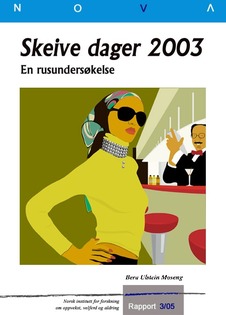| dc.description.abstract | Oslo Gay Pride 2003 - A substance abuse survey, a pilot project that has been carried out at NOVA - Norwegian Social Research, a research institute, was conducted at the request of the Norwegian Gay Health Committee and Alcohol and Drug Addiction Service (Municipality of Oslo). As of today, very little research-based knowledge has been available on alcohol and drug abuse among men and women involved in the visible gay-communities in Norway. The analysis of this convenience-based survey is based on quantitative data from 1079 gay, bisexual and lesbian festival participants, in June 2003. As a pilot survey, a primary goal of this project has been to prepare the way for further research by identifying findings and issues that should be given attention in future studies of use of intoxicants among gay, bisexual and lesbians. The report also compiles an overview of existing research-based knowledge on the subject. An initial conclusion is that men and women belonging to the gay communities in Norway are at higher risk for problematic substance use. Men and women involved in the visible gay-communities shows a trend toward greater prevalence of a history of drug and alcohol abuse compared with the heterosexual as well as the homosexual population. Drug- and alcohol-related problems amongst gay and lesbians as with heterosexuals should be put into a context of well documented risk factors such as poor social networks and mental disorders.A second finding is that the traditionally safe environment of gay bars fosters excessive drinking in the population, and there are fewer normative pressures against alcohol and drug consumption in the gay community that act as inhibitors of alcohol and drug abuse. The high frequency of alcohol consummation and drug misuse found here seems to be related to certain experiences that are quite unique for gays and lesbians. These include the psychological toll arising from the social stigma surrounding homosexuality and differential norms surrounding alcohol and drug consumption in the gay and lesbian community. A third finding is that there is evidence of greater vulnerability among homosexually experienced women to alcohol-related problems than heterosexual active women as well as heterosexually active men. In the general population women consume less drugs and alcohol than do men, and substance use substantially declines with age. Neither of these patterns were found in this survey. The report indicates patterns of alcohol use among lesbian women similar to those to homosexual men. Estimates of hash and marijuana use among homosexually experienced women is similar or higher than among homosexually experienced men.A fourth and particularly important conclusion in this study is that an undisputed identity as lesbian or gay seems to protect against alcohol or drug-abuse. Findings in this report underscore the importance of considering the within-group differences among homosexually experienced men and women in risk for drug abuse or dysfunctional alcohol use. Overall, homosexually experienced men and women are more likely than exclusively heterosexually experienced men and women to evidence higher levels of substance use. Heterosexual experienced or bisexually active men and women report higher and riskier alcohol or drug use (hashish/marijuana, heroine, amphetamines, poppers), HIV-related sexual risk taking, more depressions/affective disorders and poorer general health than men and women who are exclusively homosexually active. Among homosexually experienced men and women, those who have been exclusively homosexually active, do not show consistent evidence of at-risk patterns of alcohol and drug abuse.Oslo Gay Pride 2003 - A substance abuse survey suggests that substance abuse in the homosexual community is a public health concern requiring immediate attention. Their assumed overrepresentation among men and women in treatment for alcohol or drug problems has important implications for delivery of care. Research suggests that gay, bisexual and lesbians entering treatment for substance abuse bring with them somewhat different needs than heterosexuals, specifically in relation to different life stressors as external and internalized homophobia and heterosexism, discrimination and harassment and engaging in a "bar culture» as a primary way of socialization. It has been observed than many gay, bisexual and lesbians do not disclose their sexual orientation within the treatment environment, although issues related to living oneö‚'s life as a homosexual man or women are often salient. An important finding in this survey is that among bisexuals or heterosexual experienced gays and lesbians this problem is fairly common. NOVAs data lend support to further examination of the relationship between stress, sexual identity and heterosexual experience, HIV-related sexual risk taking, and substance abuse for gays and lesbians, which may help in tailoring clinical intervention and services for the population. | en |
